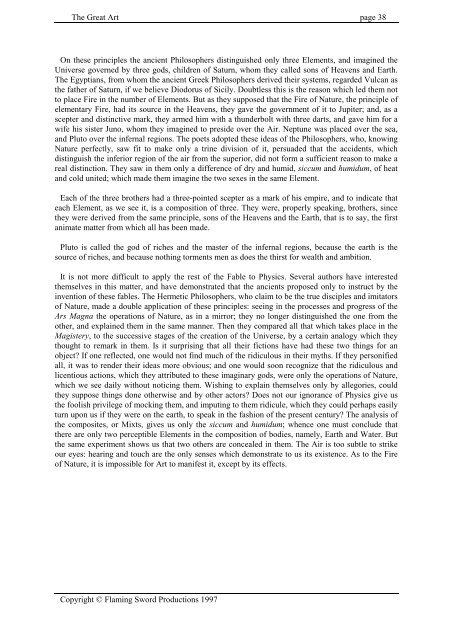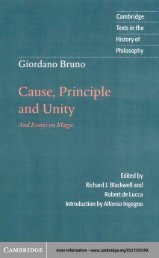The Great Art
Create successful ePaper yourself
Turn your PDF publications into a flip-book with our unique Google optimized e-Paper software.
<strong>The</strong> <strong>Great</strong> <strong>Art</strong> page 38<br />
On these principles the ancient Philosophers distinguished only three Elements, and imagined the<br />
Universe governed by three gods, children of Saturn, whom they called sons of Heavens and Earth.<br />
<strong>The</strong> Egyptians, from whom the ancient Greek Philosophers derived their systems, regarded Vulcan as<br />
the father of Saturn, if we believe Diodorus of Sicily. Doubtless this is the reason which led them not<br />
to place Fire in the number of Elements. But as they supposed that the Fire of Nature, the principle of<br />
elementary Fire, had its source in the Heavens, they gave the government of it to Jupiter; and, as a<br />
scepter and distinctive mark, they armed him with a thunderbolt with three darts, and gave him for a<br />
wife his sister Juno, whom they imagined to preside over the Air. Neptune was placed over the sea,<br />
and Pluto over the infernal regions. <strong>The</strong> poets adopted these ideas of the Philosophers, who, knowing<br />
Nature perfectly, saw fit to make only a trine division of it, persuaded that the accidents, which<br />
distinguish the inferior region of the air from the superior, did not form a sufficient reason to make a<br />
real distinction. <strong>The</strong>y saw in them only a difference of dry and humid, siccum and humidum, of heat<br />
and cold united; which made them imagine the two sexes in the same Element.<br />
Each of the three brothers had a three-pointed scepter as a mark of his empire, and to indicate that<br />
each Element, as we see it, is a composition of three. <strong>The</strong>y were, properly speaking, brothers, since<br />
they were derived from the same principle, sons of the Heavens and the Earth, that is to say, the first<br />
animate matter from which all has been made.<br />
Pluto is called the god of riches and the master of the infernal regions, because the earth is the<br />
source of riches, and because nothing torments men as does the thirst for wealth and ambition.<br />
It is not more difficult to apply the rest of the Fable to Physics. Several authors have interested<br />
themselves in this matter, and have demonstrated that the ancients proposed only to instruct by the<br />
invention of these fables. <strong>The</strong> Hermetic Philosophers, who claim to be the true disciples and imitators<br />
of Nature, made a double application of these principles: seeing in the processes and progress of the<br />
Ars Magna the operations of Nature, as in a mirror; they no longer distinguished the one from the<br />
other, and explained them in the same manner. <strong>The</strong>n they compared all that which takes place in the<br />
Magistery, to the successive stages of the creation of the Universe, by a certain analogy which they<br />
thought to remark in them. Is it surprising that all their fictions have had these two things for an<br />
object? If one reflected, one would not find much of the ridiculous in their myths. If they personified<br />
all, it was to render their ideas more obvious; and one would soon recognize that the ridiculous and<br />
licentious actions, which they attributed to these imaginary gods, were only the operations of Nature,<br />
which we see daily without noticing them. Wishing to explain themselves only by allegories, could<br />
they suppose things done otherwise and by other actors? Does not our ignorance of Physics give us<br />
the foolish privilege of mocking them, and imputing to them ridicule, which they could perhaps easily<br />
turn upon us if they were on the earth, to speak in the fashion of the present century? <strong>The</strong> analysis of<br />
the composites, or Mixts, gives us only the siccum and humidum; whence one must conclude that<br />
there are only two perceptible Elements in the composition of bodies, namely, Earth and Water. But<br />
the same experiment shows us that two others are concealed in them. <strong>The</strong> Air is too subtle to strike<br />
our eyes: hearing and touch are the only senses which demonstrate to us its existence. As to the Fire<br />
of Nature, it is impossible for <strong>Art</strong> to manifest it, except by its effects.<br />
Copyright © Flaming Sword Productions 1997

















